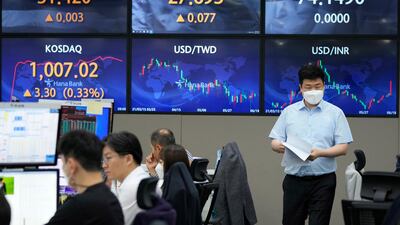Asian shares mostly rose on Friday, as investors digested the latest message from the US Federal Reserve on raising short-term interest rates by late 2023.
Japan’s benchmark added 0.3 per cent in morning trading to 29,108.23. South Korea’s Kospi edged 0.1 per cent higher to 3,266.88. Australia’s S&P/ASX 200 rose 0.5 per cent to 7,395.00. Hong Kong’s Hang Seng jumped 0.7 per cent to 28,750.38, while the Shanghai Composite slipped nearly 0.1 per cent to 3,523.05.
The Bank of Japan announced an extension of its pandemic-relief programme.
On Friday, the BOJ maintained its yield curve control targets set at -0.1 per cent for short-term interest rates and around 0 per cent for 10-year bond yields. It also extended by six months the September deadline for its pandemic-relief programme, as widely expected.
The Fed’s comments came on Wednesday, and global markets had already initially reacted on Thursday. But comments about the possibility of slowing the central bank’s bond-buying programme are rippling through markets. Such support has been a key reason for the stock market’s resurgence to records.
The S&P 500 slipped less than 0.1 per cent to 4,221.86 after meandering from a 0.2 per cent gain to a 0.7 per cent loss. Most of the stocks in the index and across Wall Street were lower, but gains for Apple, Microsoft and a few other tech heavyweights helped offset the losses.
The Dow Jones Industrial Average dropped 0.6 per cent to 33,823.45, while the Nasdaq composite rose 0.9 per cent, to 14,161.35, lifted by the gains for tech and other high-growth stocks.
In the bond market, the yield on the 10-year Treasury note gave back nearly all of its spurt from a day before. It fell back to 1.51 per cent from 1.57 per cent late Wednesday.
The two-year yield, which tends to move more with expectations for Fed actions, was steadier. It rose to 0.22 per cent from 0.21 per cent.
The first action the Fed is likely to take would be a slowdown in its $120 billion of monthly bond purchases, which are helping to keep mortgages cheap, but the Fed’s chair said such a tapering is still likely “a ways away”.
Any easing up on the Fed’s aid for the economy would be a big change for markets, which have feasted on easy conditions after the central bank slashed short-term rates to zero and brought in other emergency programmes.
While the economy still needs support, the recovery is proving to be strong enough that it does not need the same emergency measures taken at the beginning of the pandemic, said Stephanie Link, chief investment strategist and portfolio manager at Hightower.
“We are going to get a taper," she said. “They need to, we do not need emergency stimulus at this point.”
The economy has begun to explode out of its coma as more widespread vaccinations help the world get closer to normal. At the same time, jumps in prices for raw materials are forcing companies across the economy to raise their own prices for customers, from fast food to used cars.
That’s fuelling concerns over whether higher inflation will be temporary, as the Fed expects, or more long-lasting. The reality could be more mixed. The rise in commodity prices is likely tied to increases in demand as the economy recovers, but rising wages will likely be longer lasting as employers increase pay in order to attract workers, Ms Link said.
Investors got a bit of disappointing economic news when the US Labour Department said the number of Americans who filed for unemployment benefits last week rose slightly. The total of 412,000 workers filing for jobless benefits was worse than economists expected. If it proves to be a trend rather than an aberration, it could push the Fed to hold the line longer on its support for the economy.
Stocks of companies whose profits are most closely tied to the strength of the economy and to interest rates had some of the market’s sharpest losses.
Energy stocks in the S&P 500 fell 3.5 per cent after the price of crude oil sagged.
Banks struggled after the drop in longer-term yields hurt prospects for the profits they can make from lending. Bank of America fell 4.4 per cent, and JPMorgan Chase lost 2.9 per cent.
Raw-material producers were also weak, with miner Newmont down 7 per cent after the price of gold fell 4.7 per cent. Gold tends to struggle when the Federal Reserve is raising interest rates.
On the winning side were big tech-oriented companies, which have dominated the stock market for years as they’ve continued to grow almost regardless of the economy’s strength. Amazon rose 2.2 per cent, Microsoft gained 1.4 per cent and Apple added 1.3 per cent.
In currency trading, the US dollar fell to 110.20 Japanese yen from 110.23 yen. The euro rose to $1.1926 from $1.1908.

